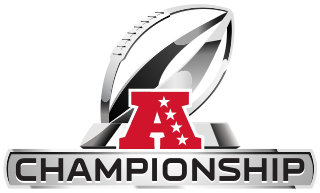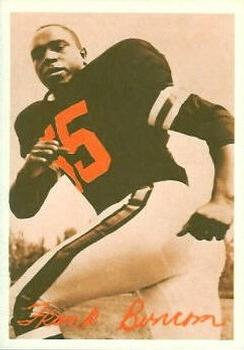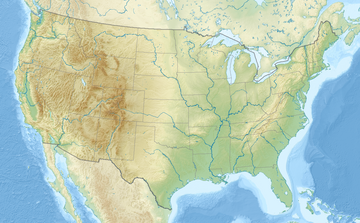
The American Football League (AFL) was a major professional American football league that operated for ten seasons from 1960 until 1970, when it merged with the older National Football League (NFL), and became the American Football Conference. The upstart AFL operated in direct competition with the more established NFL throughout its existence. It was more successful than earlier rivals to the NFL with the same name, the 1926, 1936 and 1940 leagues, and the later All-America Football Conference.

The AFC Championship Game is the annual championship game of the American Football Conference (AFC) and one of the two semifinal playoff games of the National Football League (NFL), the largest professional American football league in the world. The game is played on the last Sunday in January by the two remaining playoff teams, following the AFC postseason's first two rounds. The AFC champion then advances to face the winner of the NFC Championship Game in the Super Bowl.
For its first nine seasons, 1960 through 1968, the American Football League determined its champion via a single playoff game between the winners of its two divisions.
The 1967 Oakland Raiders season was the team's eighth in Oakland. Under the command of second-year head coach John Rauch, the Raiders went 13–1 (.929), an American Football League (AFL) record, and captured their first Western Division title, four games ahead of runner-up Kansas City, the defending league champion.

The San Diego Chargers were a professional American football team in the National Football League (NFL). The Chargers played in San Diego from 1961 until the end of the 2016 season, before relocating back to the Greater Los Angeles area, where the franchise played its inaugural 1960 season. The team is now known as the Los Angeles Chargers.

The 1960 Boston Patriots season was the franchise's first season in the new American Football League. Led by head coach Lou Saban, the Patriots finished with five wins and nine losses, last in the AFL's Eastern Division. The team played their home games at Boston University Field, later named "Nickerson Field."
The 1967 AFL season was the eighth regular season of the American Football League.
The 1966 AFL season was the seventh regular season of the American Football League. The league began its merger process with the National Football League (NFL) in June, which took effect fully in 1970.
The 1965 AFL season was the sixth regular season of the American Football League.
The 1963 AFL season was the fourth regular season of the American Football League.
The 1962 AFL season was the third regular season of the American Football League. It consisted of 8 franchises split into two divisions: the East Division and the West Division.
The 1961 AFL season was the second regular season of the American Football League. It consisted of 8 franchises split into two divisions: the East Division and the West Division.
The 1960 AFL season was the inaugural regular season of the American Football League. It consisted of 8 franchises split into two divisions: the East Division and the West Division.
The 1960 American Football League Championship Game was the first AFL title game, played on New Year's Day 1961 at Jeppesen Stadium in Houston, Texas. With New Year's on Sunday, the major college bowl games were played on Monday, January 2. This was the first time that a major professional football league's playoff game was played in January rather than December.

The 1966 Season was the 7th season for the San Diego Chargers as a professional American Football League (AFL) franchise; the team failed to improve on their 9–2–3 record from 1965. In the team's final season at Balboa Stadium, the Chargers went 7–6–1 and finished in third place in the AFL West Division. They would move to San Diego Stadium for the following season. It was the first season to feature an AFL-NFL World Championship Game, now known as the Super Bowl. San Diego began the season among the favorites to represent the AFL in the historic game, but faded after a 4–0 start, winning only three more times in the remaining ten games.

The 1965 San Diego Chargers season was their sixth as a professional AFL franchise; the team improved on their 8–5–1 record in 1964. Head Coach Sid Gillman led the Chargers to their fifth AFL West title with a 9–2–3 record, before losing the AFL Championship Game to the Buffalo Bills for the second consecutive season. It would prove to be the Chargers' last post-season appearance until 1979.

The 1964 San Diego Chargers season was their fifth as a professional AFL franchise; the team failed to repeat as AFL champions after winning the championship in 1963 with a record of 11–3, and finished at 8–5–1. San Diego struggled at the start and finish of the season, but a six-game winning streak in the middle proved to be enough to win the AFL West, in a league where the two strongest teams were in the Eastern division.

The 1963 San Diego Chargers season was the team's fourth in the American Football League. The team had gone 4–10 in 1962 but rebounded with an 11–3 record, winning the AFL West by one game over the Oakland Raiders, who were coached by former Chargers assistant Al Davis. San Diego scored the most points in the league and conceded the fewest. Their offense, led by veteran quarterback Tobin Rote, and featuring future Hall of Fame receiver Lance Alworth, gained more yards than any other team; Rote and Alworth were each named the league MVP, by the Associated Press and UPI, respectively.
The 1966 Miami Dolphins season was the team's inaugural year as an expansion franchise in the American Football League (AFL). The Dolphins were the first of two expansion teams in the AFL, founded by Minneapolis attorney-politician Joe Robbie and actor-comedian Danny Thomas. Future Harlem Globetrotters and Montreal Canadiens owner George N. Gillett, Jr. was a minority partner, and the team was led by head coach George Wilson. The franchise was granted in August 1965 for $7.5 million.







